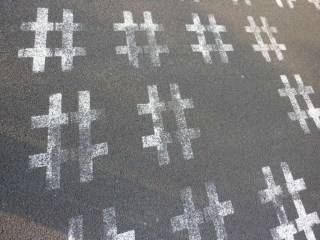
Hashtags actually are good for something besides the hilariousness of the Jimmy Fallon & Justin Timberlake video “#Hashtag” (inline below, but watch out for some bleeped rough language.)
The hashtag itself is simply the number sign (or pound or hash, depending on your naming preference) followed by a word or short phrase (with all spaces removed if it’s a phrase.) In some social media venues, this combination of # and a word (or words) automatically becomes a searchable link, allowing you to use hashtags to join your post to larger conversations.
First we’ll look at a couple of quick examples and then we’ll discuss the social media platforms that support hashtags as well as how to use them to start your own conversations.
Good Use of Hashtags
Let’s say you just finished your first 10K race in Houston, Texas. You’re super pumped and want to tell the world. You might create a post on Facebook or Twitter that says,
“Just finished my first #10k. #houston”
Your use of #10k and #houston does more than just add a symbol to the 10K and a location of Houston. While you post might normally just been seen by your own friends and family, by using the hashtags of #10k and #houston you just joined two much larger conversations. Now, anyone seeing someone else’s post using either #10k or #houston could click on those hashtag links in another post and your post could come up in their listing of posts. Of course, worldwide, those two conversations might be quite large. So let’s narrow our conversation.
Instead, let’s say you just finished the Houston Marathon. They’ve created their own hashtag (see Starting Your Own Hashtag Conversation below) of #houmarathon and encourage people to use it. After finishing the race, you post a tweet of
“Just finished my first marathon. #houmarathon.”
Now you’ve joined a smaller social media conversation. You might look through a list of tweets or status updates containing that hashtag and see posts by friends or even people you passed during the race.
Similarly, if you were using Instagram, you could easily look through all the Instagram photos taken during the race. In fact, as of this post we’re ten weeks away from the Houston Marathon and people are already posting photos of their training workouts leading up to the race: http://websta.me/tag/houmarathon.
You can certainly join your post to many conversations by using many hashtags, but that leads us to our next section.
Bad Use of Hashtags
Of course, as with any good thing, some people are going to use and abuse it. Overuse of hashtags or joining your post to meaningless conversations can start to feel like spam to the people reading them.
“Just finished my first marathon. #houmarathon #tired #nearlythrewup #burned2500calories #iwantacheeseburger”
You joined a meaningful conversation here, but then you just got silly. And you know what, that’s OK sometimes. I just wouldn’t do that all the time and I would only do it on my personal accounts, not my professional accounts. The Jimmy Fallon video to the right pokes a little fun at the hashtag overusers by taking them off the computer screen and putting them into a real conversation.
As a side note, after seeing that video for the first time, my daughter and I were sitting in a restaurant mimicking it during our own conversation. When we finally started laughing at ourselves, a woman at the table next to us said, “Oh thank God. I thought you were being serious and that was actually catching on.”
Especially for your business, keep it to one or two hashtags. Maybe (probably not, but maybe) three if they are all really pertinent.
Starting Your Own Hashtag Conversation
No one owns hashtags. Although if you try to commandeer a common one for your own purposes, you may get some bad social media feedback. If you need your own, come up with something unique (or pretty close to unique.)
Combine a few words that are meaningful to your brand, product, or event, and then search for them at Hashtags.org or the social media platform of your choice. Keep in mind that a good hashtag is short, easy to type, and meaningful.
Businesses and organizations can use their name (#toastmasters, #unitedway, #nike,) their slogans (#justdoit, #bringbackourgirls,) or some regional or date based combination (#komentx, #oscars2015) to begin worldwide conversations. For a small business, you may be the only one talking for a while, but sooner or later, people will listen and start to talk back.
Where You Can Use Hashtags
Many social media platforms support hashtags and more are joining the trend all the time. The major social media platforms supporting hashtags are Twitter (where it all began in 2007,) Facebook, Instagram, Vine, Google+, Tumblr, and Pinterest.
The Quick Takeaway
There is so much content on the internet, that it can seem impossible to find people talking about the same things as you. But through the use of hashtags, you can put yourself into meaningful conversations and get the attention of other people who are either talking in or listening to that conversation.